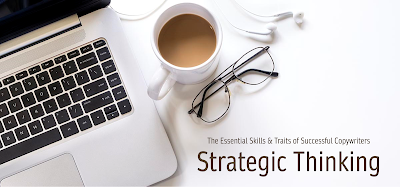A copywriter's job is to craft persuasive and impactful content that drives engagement, conversions, and ultimately, business success. To excel in this role, however, copywriters need more than just excellent writing skills. They must also possess strategic thinking abilities that allow them to align their copywriting efforts with broader marketing goals, develop effective content strategies, and contribute to the overall success of marketing campaigns. Here are 5 reasons why strategic thinking is a critical skill for copywriting success and how it enhances a copywriter’s ability to create cohesive, purposeful, and results-driven copy.
Aligning Copy with Marketing Goals
Strategic copywriters understand the importance of aligning their writing efforts with the broader marketing goals of the organization. By gaining a deep understanding of the marketing objectives, target audience, and brand positioning, they can create copy that supports and reinforces the overall marketing strategy. This alignment ensures that the copy is not only compelling and engaging but also directly contributes to the achievement of desired marketing outcomes.
Developing Content Strategies
Successful copywriters take a strategic approach to content creation. They develop comprehensive content strategies that encompass the entire customer journey, from awareness to conversion. By analyzing market trends, conducting competitor research, and understanding audience preferences, strategic copywriters can identify content gaps, prioritize topics, and create a roadmap for content creation. This strategic thinking allows them to deliver the right message, at the right time, and through the most appropriate channels.
Contributing to Marketing Campaigns
Strategic copywriters actively contribute to the development and execution of marketing campaigns. They collaborate closely with marketing teams, designers, and other stakeholders to ensure that the copy aligns with the campaign objectives, messaging, and creative direction. By understanding the campaign's target audience, value proposition, and desired outcomes, strategic copywriters can create copy that integrates seamlessly into the overall campaign, amplifying its impact and effectiveness.
Identifying Key Messaging and Differentiators
Strategic thinking enables copywriters to identify the key messaging and differentiators that set a brand apart from its competitors. By conducting market research and understanding the target audience's needs and pain points, strategic copywriters can craft copy that highlights the unique selling propositions and positions the brand effectively. They can distill complex information into concise, persuasive messages that resonate with the audience and create a compelling brand narrative.
Evaluating and Optimizing Performance
Strategic copywriters are not just focused on writing copy; they also pay attention to its performance. They analyze data, track key metrics, and evaluate the impact of their copy. By leveraging analytics tools and A/B testing, strategic copywriters can identify what resonates with the audience, refine their messaging, and optimize their copy for better results. This data-driven approach allows them to continuously improve their content and contribute to the overall marketing effectiveness.
To Sum Up: Strategic thinking is a critical skill for copywriting success. It empowers copywriters to align their copy with
broader marketing goals, develop effective content strategies, contribute to
marketing campaigns, identify key messaging and differentiators, and evaluate
and optimize performance. By incorporating strategic thinking into their
copywriting process, copywriters can create cohesive, purposeful, and
results-driven copy that not only engages the audience but also supports the
organization's marketing objectives. Strategic copywriters are invaluable
assets in the marketing landscape, playing a key role in driving business
success through their ability to think strategically and create impactful copy.
Strategic Thinking is just one of many skills and traits
that have been identified as essential for success as a copywriter. Learn about
the rest here: 40 Essential Skills & Traits of Successful Copywriters






